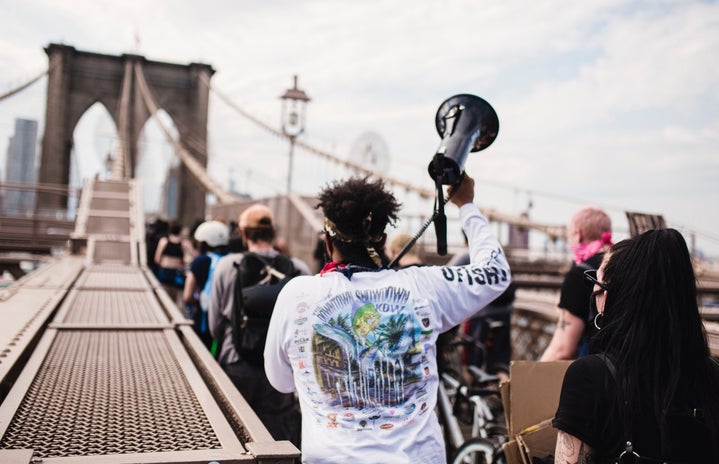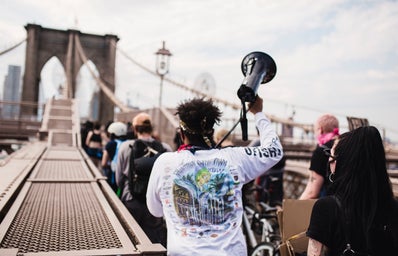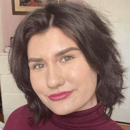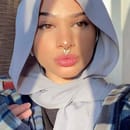I personally believe that issues do not become real or important to people until they become personal. I would encourage whoever may be reading this article to make issues personal. Build new bonds with people. All our struggles are connected.
The most effective way to show allyship or advocate for someone is to attend protests. However, this might not be possible for everyone to do. Whether it be due to a disability, you’re not at the point with your allyship, or simply your work life is too demanding. There are many reasons. However, simply because you cannot attend a protest does not mean you cannot protest. Anything that challenges oppression is a protest.
Here are some ways to protest if you cannot attend a protest
- Making issues personal to you
-
All struggles are connected through intersectionality, which is a term coined by Kimberle Crenshaw. Intersectionality is the concept of overlapping identities. For instance, someone could be gay, black, and Christian. It is important to understand that many different issues bleed into one another. An example would be how trans women have to enter the sex work industry due to discrimination in the workplace which leads them into homelessness or incarceration. That sentence alone highlights four separate political issues which could be relevant for many different groups of people. The issues were trans issues, incarceration, homelessness, and sex work.
It was not until I began to volunteer with an extremely wide range of people did I fully understand the complexity and range of privilege and oppression. Prior to me doing this, I only focused on issues pertaining to black and LGBTQAI+. However, disabled people, homeless people, newcomers, elderly people, and many more can fall into the categories of being black or LGBTQAI+ too. However, I did not advocate for those groups.
People typically care about people that look like them or have a loved one that is of an oppressed group. That is why I am encouraging you to make these issues personal.
I am on a committee advocating for housing to help homeless women and trans women. During a meeting, the policy analyst presented her data on hidden homelessness. I was the only one that noticed her data did not incorporate newcomers that come to Canada who get put into homeless shelters and mentally ill women who cannot find housing and are put into homeless shelters.
If I did not expose myself to different groups of people, no one would have said anything, and nothing would change.
- Absorbing Different Cultures’ Media
-
It is one thing to learn the oppression of a group of people, but it is a whole different experience to learn about their culture. This may sound very odd but follow cultural meme accounts such as @decolonizespringfield, which is run by Indigenous Peoples. The account talks about many different indigenous issues through The Simpsons memes. There are many different indigenous TikTokers that are hilarious and educational such as @uronlootedland.
One of the things Indigenous Peoples joke about the most is land acknowledgements. I would have no idea about that unless I followed these accounts. Now when I do a land acknowledgement, or I am a part of a group that does, we add ways to donate to current land defenders on top of the land acknowledgement.
Also, follow people that do not share your identity. I follow many different hijabi fashion Instagrams. Let me tell you, they NEVER disappoint. My favourites are @nawalsari, @frishtag_and @noore. I also like @baraabolat, but she is more lifestyle than fashion. Prior to finding them on Instagram, I had no negative connotation towards hijabis. However, after I took in more of that kind of media, I learned a lot more about their different cultures. There are also autistic TikTok accounts that are so cool and informational too, like @paigelayle and @autieoddity.
- Listening to Podcasts
-
I feel podcasts are such a unique way to get to know someone. In terms of exposing yourself to different kinds of people, I would recommend the following podcasts.
Arab-American Psycho: [KT1]
The host is named Noor Elkhaldi; she is so incredibly sassy but in the absolute best way. It is a lifestyle and political podcast. She says literally whatever is on her mind. She is also very interactive with her fans. I believe I messaged her twice on Instagram, and she responded each time.
The Immigrant Section
The podcast is hosted by Abbas Wahab a Sundanese immigrant who did exactly as his parents wanted him to. He went to school, became an engineer, had a high-paying job, a nice car, and everything in between. Then he realized, “I am not living my life for myself but rather one for everyone else”. He then quit his job and is now trying to become a comedian in Toronto. Usually, on his podcast, he will invite a fellow comedian. Then they will talk about obscure topics but through the lens of being immigrants. Honestly, it is an extremely authentic and hilarious podcast. It also exposes you to many different types of people.
Warrior life
This is an indigenous podcast which is hosted by a Mi’kmaq lawyer Dr. Pam Palmater. This podcast showcases many different indigenous issues. The first exposure I got to a current issue Landback Lane, was on that podcast.
- Educating Yourself
-
There are many books to learn about allyship. One, in particular, would be “3rd Edition Becoming an Ally: Breaking the Cycle of Oppression in People” by Anne Bishop. I would recommend reading this book first before any other social justice book. Only because it explains the societal structures of privilege and oppression through many different facets for everyone. Bishop dissects the multiple layers of every facet of oppression within each individual person. The book even educates the reader on the history of conquering pre-colonization. The book can be found on Amazon for $28. It is an easy read given it has just over 200 pages.
It is very important you seek out media that is done by the group of people you want to learn about. There are so many different kinds of people and walks of life in the world. Therefore, there are endless things to learn.



